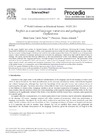Please use this identifier to cite or link to this item:
https://accedacris.ulpgc.es/jspui/handle/10553/53775
| DC Field | Value | Language |
|---|---|---|
| dc.contributor.author | Luisa Carrio-Pastor, Maria | en_US |
| dc.contributor.author | Alonso-Almeida, Francisco | en_US |
| dc.contributor.other | Alonso-Almeida, Francisco | - |
| dc.contributor.other | Carrio Pastor, Maria Luisa | - |
| dc.date.accessioned | 2019-02-04T18:13:35Z | - |
| dc.date.available | 2019-02-04T18:13:35Z | - |
| dc.date.issued | 2014 | en_US |
| dc.identifier.issn | 1877-0428 | en_US |
| dc.identifier.uri | https://accedacris.ulpgc.es/handle/10553/53775 | - |
| dc.description.abstract | In this paper, English texts written by Spanish learners with B2 level of proficiency, following the Common European Framework of Reference for Languages (CEFR), were contrasted with texts written by native English speakers in order to detect the most common writing changes (variations) motivated by the mother tongue of the writers. Our objective was to determine the causes of these variations in language production and to explain the pedagogical implications that could be derived from our findings. The results showed that there are differences in the texts produced by writers with different linguistic and cultural antecedents, although their language proficiency was high enough to not produce grammatical errors. The grammatical items analysed in the texts produced by native and non-native writers to look for language variation were articles, the passive voice, tenses, relative clauses, and certainty and uncertainty expressions. Most of the variations found were caused by the interference of the mother tongue, as a consequence, most of the pedagogical implications focused on avoiding these variations. | en_US |
| dc.language | eng | en_US |
| dc.publisher | 1877-0428 | |
| dc.relation.ispartof | Procedia - Social and Behavioral Sciences | en_US |
| dc.source | Procedia - Social and Behavioral Sciences [ISSN 1877-0428], v. 116, p. 377-381 | en_US |
| dc.subject | 58 Pedagogía | en_US |
| dc.subject.other | Cultural influences | en_US |
| dc.subject.other | Mother tongue | en_US |
| dc.subject.other | Variation | en_US |
| dc.subject.other | Second language | en_US |
| dc.title | English as a second language: variations and pedagogical implications | en_US |
| dc.type | info:eu-repo/semantics/conferenceObject | en_US |
| dc.type | ConferenceObject | en_US |
| dc.relation.conference | 5th World Conference on Educational Sciences (WCES) | |
| dc.identifier.doi | 10.1016/j.sbspro.2014.01.225 | |
| dc.identifier.isi | 000335471200067 | - |
| dcterms.isPartOf | 5Th World Conference On Educational Sciences | |
| dcterms.source | 5Th World Conference On Educational Sciences[ISSN 1877-0428],v. 116, p. 377-381 | |
| dc.description.lastpage | 381 | - |
| dc.description.firstpage | 377 | - |
| dc.relation.volume | 116 | - |
| dc.investigacion | Artes y Humanidades | en_US |
| dc.type2 | Actas de congresos | en_US |
| dc.identifier.wos | WOS:000335471200067 | |
| dc.contributor.daisngid | 2277450 | - |
| dc.contributor.daisngid | 3148892 | - |
| dc.description.notas | 5Th World Conference On Educational Sciences - WCES 2013 | en_US |
| dc.identifier.investigatorRID | M-2876-2013 | - |
| dc.identifier.investigatorRID | No ID | - |
| dc.contributor.wosstandard | WOS:Carrio-Pastor, ML | |
| dc.contributor.wosstandard | WOS:Alonso-Almeida, F | |
| dc.date.coverdate | 2014 | |
| dc.identifier.conferenceid | events120859 | |
| dc.identifier.ulpgc | Sí | es |
| item.grantfulltext | open | - |
| item.fulltext | Con texto completo | - |
| crisitem.event.eventsstartdate | 05-02-2013 | - |
| crisitem.event.eventsenddate | 08-02-2013 | - |
| crisitem.author.dept | GIR Discourse, Communication and Society | - |
| crisitem.author.dept | Departamento de Filología Moderna, Traducción e Interpretación | - |
| crisitem.author.orcid | 0000-0003-4676-3831 | - |
| crisitem.author.parentorg | Departamento de Filología Moderna, Traducción e Interpretación | - |
| crisitem.author.fullName | Alonso Almeida, Francisco Jesús | - |
| Appears in Collections: | Actas de congresos | |
WEB OF SCIENCETM
Citations
2
checked on Mar 1, 2026
Page view(s)
83
checked on Jan 10, 2026
Download(s)
104
checked on Jan 10, 2026
Google ScholarTM
Check
Altmetric
Share
Export metadata
Items in accedaCRIS are protected by copyright, with all rights reserved, unless otherwise indicated.
